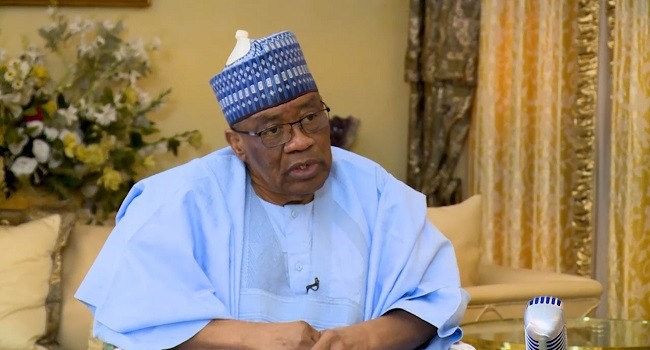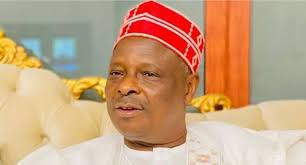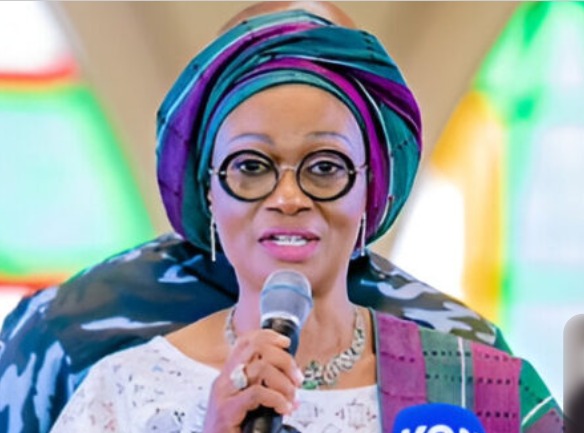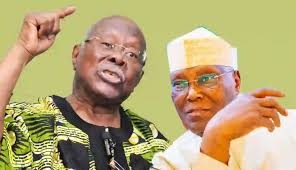Dr Hakeem Baba-Ahmed served as the Special Adviser on Political Matters in the Office of Vice President Kashim Shettima for 17 months before resigning.
In this interview aired on Politics Today, a Channels TV programme, he speaks on his open letter to President Bola Tinubu in which he asked him not to contest in 2027, why he stepped down from the administration and the gale of defections that has rocked the country in recent weeks. Excerpts:
Who offered you the role of political adviser?
To be honest, Vice President Kashim Shettima. But he had to get the consent of the president before I became an adviser. I mean, the vice president facilitated my appointment, and the president approved it. So, I would say President Tinubu approved my appointment. Otherwise, I would never have been an adviser.
Given what you represented politically in the past, did it cause some kind of distrust between you, some of your friends and family members?
No, not at all. Not at all. And look, working for a government, especially Tinubu’s government that had inherited a really messed up country by Buhari, was the most patriotic thing anybody could do. You could not just turn your back on an administration that says: ‘come and help fix the country after the damage that you so graphically criticised’. I was one of the most vocal critics of former President Buhari. So, if a government takes over from President Buhari and says: ‘come and help fix the country,’ you could not possibly say: ‘no, I prefer to be a critic for life’. I participated very actively in Buhari’s election.
I was chairman of his party for four years in my state, long before he became president, so I was not a critic. I became an outspoken critic: one, because my organisation had seen the situation in which the country was. A few months into the presidency of President Buhari, we could see that he was just interested in becoming president, and he was not interested in governing. Certainly, not governing well, and we started criticising him. We began by advising him privately. Then we started saying he was wrong here and he was wrong there. And then when it became clear that he was not interested in public opinion, we became outstanding critics.
For those of you who backed Buhari, did he disappoint you?
Absolutely.
But Buhari represented the North…
No, he did not. If you are talking about how he became president, that is a different thing. We did not support Buhari because he was a Northerner. We supported Buhari because he was a better option than Jonathan in 2015. He was a much better option at the time. And we supported him because we could quite clearly see that Jonathan’s administration was weak. It was soft on Boko Haram. It was soft on corruption.
It was soft on a lot of things that we believed a government that had inherited from Yar’Adua ought to have been doing. We needed a president who would hold the country together, and we saw in Bahari a better option. And we supported him, not because he was a Northerner, but because we thought he was tough on corruption. He had fought Chadians who had invaded Nigeria many years ago. He had run a country that jailed corrupt politicians for 300 years and stuffs like that. We supported him, and it could have been anybody. We just were looking for a better option than Jonathan.
But Buhari ended up being the opposite…
Yes, absolutely. I do not think we have had a government that is worse than Bahari’s government.
You think Buhari’s government was the worse in history?
Well, we have not had a government, and not by the records that I have seen. And believe me, I am 70 years old and I have followed Nigerian politics from way back in the early 70s.
I have not seen eight years under a leadership that just did not govern, did not care about the priorities, did not set priorities, did not chase, did not care about how the poor lived, how secure the country was, how the young people needed to find futures. I did not see one. Therefore, I could not see myself sitting on the fence when another government that had the mandate of Nigerians to fix Buhari’s damage says: ‘please come in and help.’ It would have been irresponsible to say no.
Do you regret that you worked with Tinubu?
No, I do not.
Would you do it again if you had the opportunity?
With the way the Tinubu government is going, no. But regretting going in, I do not. I got out because there was no space. I did not see that fire, commitment and zeal to fix a country that has been wrecked. Instead, I saw a country getting worse.
Are you saying what you saw was more of a facade, not real commitment?
See the records. The one I saw was where, in 2023, Nigerians lined up, elected President Tinubu, because they thought, okay, Buhari is gone, we are in a mess, let us elect a president that would fix Nigeria. President Tinubu comes in and says: ‘put your belts on, we are going into some turbulence’. Thus removed subsidy, and you would think a president at that stage was quite prepared to undertake such a monumental policy. It turned out he did not. He had a handful of advisers that then had to fix a problem. They started looking for solutions.
From day one, he pushed the country to the deep end. And we have never really recovered in a way. We keep seeing promises. And the difference between what President Tinubu’s people say the country is, and the difference between that and what the country is today, is miles apart. And you have to wonder whether we are living in the same Nigeria. I think that the issue is: should one have committed to working for a government that had at least the mandate of the people to fix things, particularly in the Northern part of the country. It is unbelievable the levels of insecurity and poverty.
Is it worse than the Buhari government left it?
It is worse than Buhari left it.
Really? But the statistics do not say it’s worse?
This is the thing with the statistics that the administration keeps reeling out. And you really wonder where they get the statistics from. You go to villages, go to Kastina, go to Zamfara, go to Niger State, go to Plateau, go to Benue, virtually, in fact literally, go to every part of Nigeria. More blood is shed now than it was maybe two years ago. And yet you see these kind of statistics that say there are less killings, there are less violence. You have to ask, do our leaders actually know how our people live? Who is telling them all this? How do these statistics get acquired? Because if you want to really measure how people live, you do not do that by just some statistics that someone gives you. Do the president’s people really tell him the state of the country? Does he know? Does he know the level of poverty? Does he know how many families, entire families live in that village?
This was a man who was governor of Lagos State and he was on the street himself. Is it different from the Tinubu that is in the presidency right now?
I saw a president that was stubborn, almost visionary, but he ran Lagos for eight years. Whether he ran it well or not, I do not know. But he ran Lagos well. He resisted former President Olusegun Obasanjo’s overbearing and strong determination to get rid of him. Beyond that, then I saw him as a calculating politician. He gave his platform to Atiku. He gave his platform to Nuhuru Ribadu. He participated actively. Then he agreed with Buhari, created a platform which allowed Buhari to become president. Because for 2003, 2007, 2011, Buhari was running, he did not get anywhere.
So without Tinubu, Buhari might or might not have made the position?
To be honest with you, I think that coalition, CPC-APC-AC, was decisive in terms of giving President Buhari victory. And as I said, I was part of the campaign. I had a front line seat, so I know what I am talking about. And Tinubu’s contribution to Buhari’s emergence was genuinely a deciding factor. So in many ways, you have to give him credit for being a calculating president. I do not know what has happened since 2015, but I do not see the fire. I do not see that calculation. I did not see much of him, to be fair to him.
You were called in to advise this government on what Tinubu was very good at. Some think that he is a master strategist, politically speaking. And that is what you were called in to do. Would you say that you were allowed to do your job?
No, I did not do any job. I was supposed to be an adviser on political matters.
To the vice president or to the president?
To the president, in the office of the vice president. You have to understand, at least in constitutional terms, it is the same thing. Basically, it is supposed to be both the vice president and I, we are both supposed to advise the president.
In the real sense of it, there isn’t a political adviser to the president…
There are two. There is one called Darazu. So there are two special advisers on political matters. Well, I have not met the first one either.
With about six months or so that you spent in that place?
I spent a year and six months there.
Did you request to meet the president?
To be honest, I suspect if I met the president, if I did sit down with him, I might say things to him that he might not be very happy about. I think they developed cold feet. Because if I did, I would have told him exactly what I said in that open letter: ‘Mr President, please do not run again.’
Why? What gives you the authority?
It is not authority. I am making a request. I am not giving him instructions. I remember I said, I would have said: ‘Mr President, please do not run again.’
Why?
I think that first he has become a president, so that’s settled. A lot of the people who are now, including President Tinubu, quite possibly, want to be president just simply because they want to be presidents. We had the case of Buhari, perhaps even Atiku whose multiple attempts at becoming president may be primarily driven by the desire to be president. If he spends the next two years of his life on the things that he ought to have done that he has not done yet or improving on what he has done.
And then, like I said in my letter, look for a younger person, more energetic, healthier, more focused, more committed to the future of this country; find even from your party, find someone that a group of people among younger people, the kind of people who really feel the pain about what Nigeria is today. The kind of people whose children are just growing up and they can look at them and say: ‘what will happen to my child or my grandchild in the next 20 years?’ The way this country is going downhill, consistently going downhill. There are a lot of educated, very athletic Nigerians who desperately want to be part of the future of this country. Trust them with power. You have done your bit. And so you do not need to run for another one. Spend the next two years fixing Nigeria, fix the economy as much as possible, fix insecurity.
So you think that he doesn’t have the capacity for the next four years after the initial four years?
Well, it is not so much that he does not have the capacity. I do not know what will happen in the future. I have not seen evidence that the last two years have prepared him to continue to govern for six years, but more importantly, he does not need to be president to actually do something good for this country.
If he draws the line at 2027 and prepares his party and the country to vote in a new set of people everywhere APC governor stands now, use your power and influence, get them to bring out younger people, a lot of people with energy, commitment, passion to fix what is broken, which is this country, history will record you as the greatest leader.
Would you like him to have taken that choice of that person from the South-West?
Let him come from anywhere. Believe me, at this stage, it is not important anymore. He could come from anywhere at this stage. Anybody who is talking to you about North and South doesn’t know what they’re talking about.
So you are not impressed by what you have seen so far. And you don’t think that with what is on the ground, he should not run in 2027. Do you also imagine that maybe you were wrong in your assumption that maybe Tinubu was a better candidate than those who were on the ballot in 2023?
I never really participated much in choosing who should vote.
But for the benefit of hindsight, do you think he was better than the lot that were on the ballot in 2023?
Again, to be honest with you, I participated with Northern groups in assessing these candidates. You remember there was a time when Northern groups got together. About five or six people turned up and we asked them questions. Beyond the moment parties choose who they wanted, as far as I was concerned, my job was done. In fact, everybody’s job was done. You had to leave the whole thing to the voter. Voters decided it was Tinubu. As far as I was concerned, that is a decision made democratically. If anybody disputed it, they could go to court. I had no problems with him being legitimately elected as president. I wanted him to succeed. I want him to succeed.
If he calls you back and says, sorry for whatever happened…
He won’t. No, I won’t go back. I can’t. Come on. Not for anything. Not for anything. I have done my bit. It did not work out. I have to move on.
But what if it’s in the interest of the nation?
It can not be in the interest of the nation if I am just going in and out. I will be like some of these politicians jumping to one party in the morning and then the next evening, they have another party. They are talking about coalitions. I want to be better than those guys.
There is this very strong story going around that the vice president may have been sidelined. When you were on the inside, what did you see?
I did not see it. I find it odd.
Is the cordiality still there between the men?
Well, between the two of them, I think those rumours are cooked. To be honest, we never really interacted. I never sat down with Tinubu to ask him about how he felt about Shettima. I spoke with Shettima. And that is what I can tell you only from Shettima’s perspective. I do not think Shettima feels he has been sidelined. I do not think he feels Tinubu has any grievances against him.
But what did you see?
I saw a president and a vice president who worked well. The synergy was there.
Was it better than the Obasanjo-Atiku synergy in the first four years?
You picked the wrong example. The first four years of Obasanjo-Atiku were immensely powerful, and had a lot of trust. But you have to remember, Obasanjo literally didn’t know anything about being a democratic president. Atiku did because he was a politician. He was also an elected governor. Now then, in the transition between 2003 and 2007 again, Obasanjo’s second term, they fell out. And that’s it. Obasanjo decided he was not going to go on to sack him or impeach him, but he’s going to continue and he will render him completely redundant. And he did.
Since that letter where you asked him not to run in 2027 was published, people have asked me why you singled out Tinubu. What about other politicians?
If I have a chance to sit with the Waziri of Adamawa, I would say to him, he might know a little bit better than I know Tinubu. Sir, you have done your bit, you have held up the democratic process and represented it well. Your name has been written in gold. You have been persistent. It’s time to yield the ground, yield the position to a younger person. Do not run. Play the father role. Find good younger person.
Do you think Atiku will listen to that kind of advice?
I think so. To be honest with you, I think so. I do not think it matters. He wanted to be president. I’m advising them against what appears to be what they want. And I’m trying to point out to them. Actually, the truth about it is that if the Peoples Democratic Party, PDP, were to field a younger person, more capable, somebody with less skeletons in their cupboard, somebody with less liabilities, age and health and everything.
Believe me, they will take the All Progressives Congress, APC, to the cleaners. With all this bulging party, bulging with people running away from prosecution, people looking for offices, the APC is growing with a lot of the wrong people. All these defections are informed by only one thing, they are looking for positions or running away from the Economic and Financial Crimes Commission, EFCC.
But the EFCC Chairman said there is nothing like that, and there is no political interferences…
They won’t write to him saying: ‘dear chairman of EFCC, it may have come to your notice that I am leaving my party PDP to join APC. Believe me, it has nothing to do with the file that is in front of you, I want to fix the country.’ They are likely not going to tell him.
I am telling you that the people who are running into the APC from all over the place are actually a liability to the APC. It is simply a political refugee camp, and it would burst.
What is the position of the North on Tinubu?
The North wants Tinubu to fix Northern problems. Insecurity, poverty, joblessness, drugs. I attended the meeting of the Arewa Consultative Forum, ACF. The language there and the atmosphere was different from any other time I have seen. My group, the Northern Elders Forum, NEF, is the most militant group.
Yesterday’s meeting, the one I attended was unique in the manner people spoke, not hostile, not subversion just simply a demand. The North demands more attention. Attention to its problems. Insecurity is rising. Poverty is rising. We are beginning to be marginalised.
We look like a region of voters, only useful every four years. With two years to go, the North is saying to President Tinubu, look at us, we matter. This country is breaking down, every inch of Nigeria is suffering, but the North is suffering a lot more than others. You won’t get that rhetoric that it has be a Northerner this time.
The language will be: it has to be a better person. We want to see someone who has either work for the North or will work for the North and the South-East, South-West and South-South.



